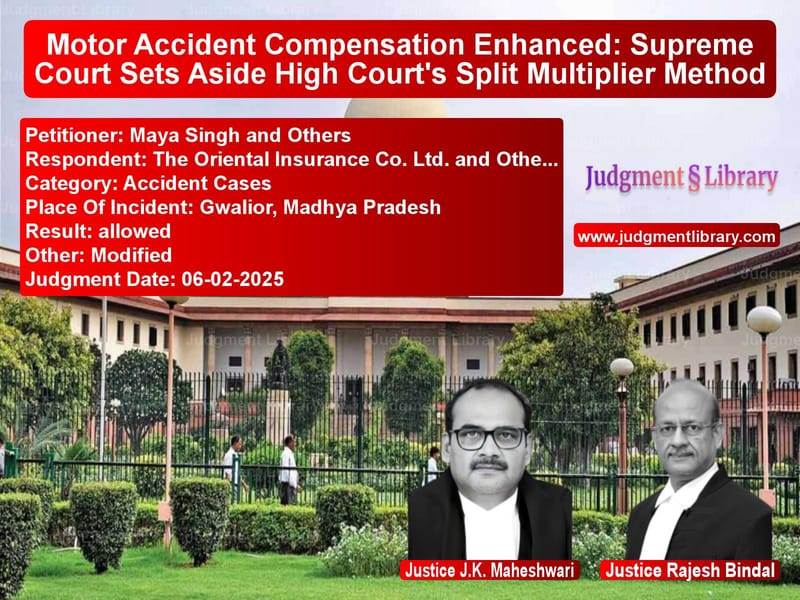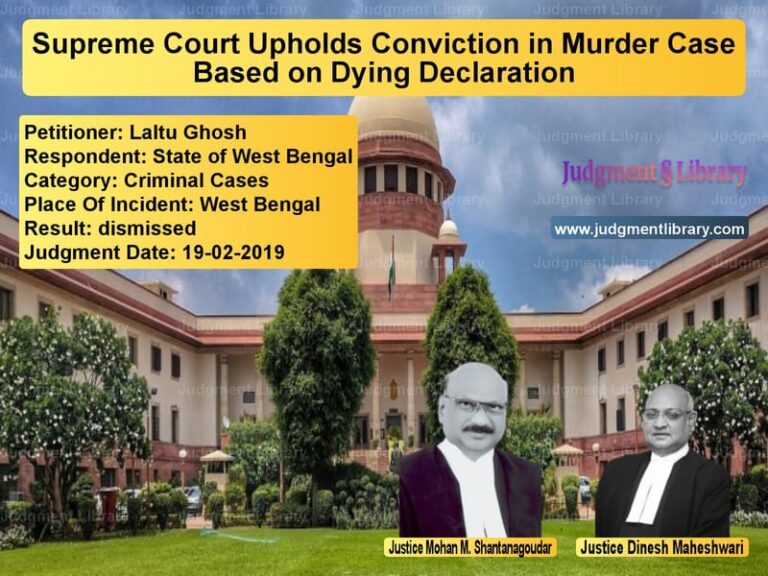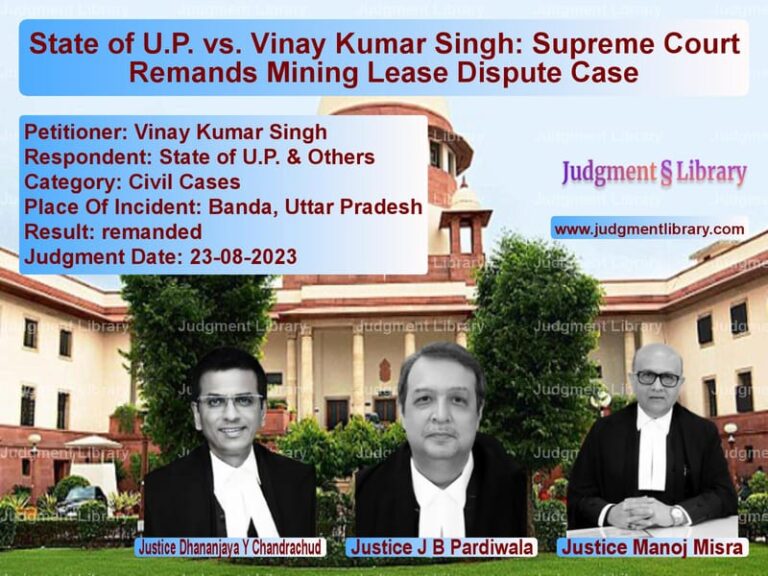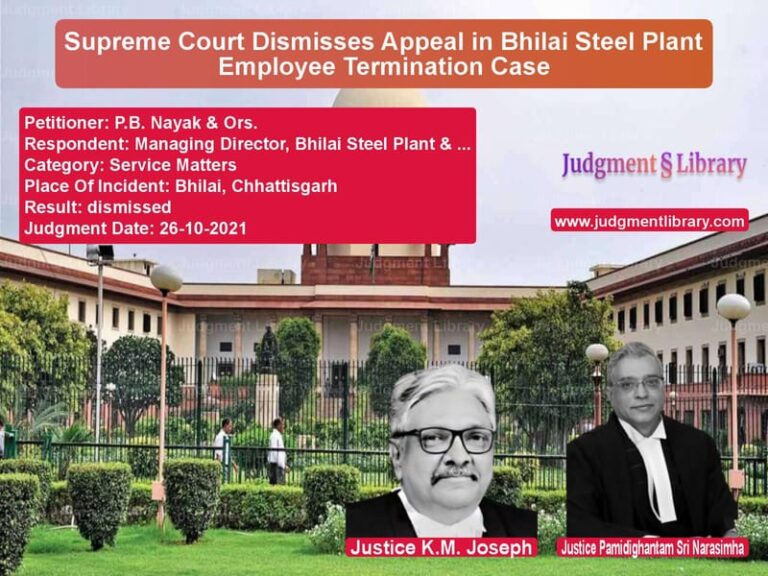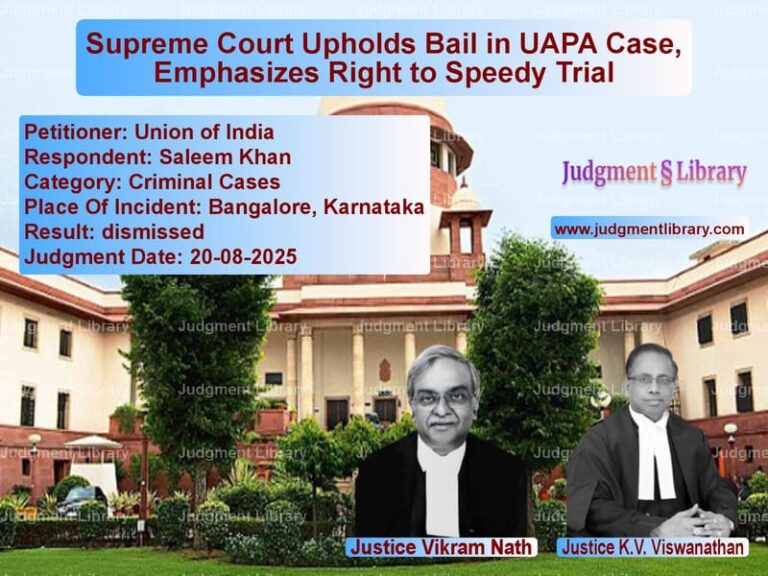Motor Accident Compensation Enhanced: Supreme Court Sets Aside High Court’s Split Multiplier Method
The case of Maya Singh and Others vs. The Oriental Insurance Co. Ltd. and Others revolves around a tragic motor accident that resulted in the death of Laxman Das Mahour. The Supreme Court, in its judgment, set aside the High Court’s decision to reduce the compensation amount and reinstated a higher award for the claimants.
The case concerns the compensation awarded to the deceased’s family under the Motor Vehicles Act, 1988. While the Motor Accident Claims Tribunal (MACT) had awarded Rs. 28,66,994/-, the High Court reduced it to Rs. 19,66,833/- by applying the split multiplier method, reasoning that the deceased would have retired in two years. The Supreme Court ruled that this approach was erroneous and restored a fairer compensation amount.
Background of the Case
The accident occurred on March 7, 2014, when Laxman Das Mahour was hit by a bus while walking on the road after deboarding another vehicle. He succumbed to his injuries at the scene. The claimants, including his widow and dependent children, filed for compensation under the Motor Vehicles Act.
The MACT awarded compensation based on the deceased’s salary, applying a standard multiplier to assess future earnings. The insurance company challenged the award before the High Court of Madhya Pradesh at Gwalior, which reduced the compensation by applying a split multiplier—a method that calculates different multipliers for the remaining service period and post-retirement years.
Compensation Calculation by MACT and High Court
The MACT initially awarded the following compensation:
- Loss of dependency: Rs. 27,41,994/-
- Loss of consortium (to wife): Rs. 1,00,000/-
- Funeral expenses: Rs. 25,000/-
- Total Compensation: Rs. 28,66,994/- with 7.5% interest per annum
The High Court revised the compensation as follows:
- Salary for the remaining service period: Rs. 8,69,000/-
- Salary for an incremented period before retirement: Rs. 2,97,500/-
- Pension (after retirement): Rs. 16,78,750/-
- Dependency deduction (1/3rd reduction): Rs. 9,48,416/-
- Loss of estate: Rs. 15,000/-
- Funeral expenses: Rs. 15,000/-
- Loss of consortium: Rs. 40,000/-
- Total Compensation: Rs. 19,66,833/-
Arguments Before the Supreme Court
Appellants’ Arguments (Claimants)
The claimants’ counsel contended:
- The High Court erred by applying the split multiplier method, which is against established precedents.
- The correct multiplier should have been applied to the entire loss of earnings without bifurcation between pre-retirement and post-retirement earnings.
- The decision in National Insurance Co. Ltd. vs. Pranay Sethi mandates compensation based on loss of earnings, with an additional 15% for future prospects.
- The High Court’s decision to reduce consortium compensation was unfair.
Respondents’ Arguments (Insurance Company)
The insurance company’s counsel argued:
- The deceased was close to retirement, and after retirement, his income would have been significantly lower.
- The split multiplier method accounts for post-retirement income and is a fair approach.
- The dependency calculation should be based on pension earnings after retirement.
Supreme Court’s Observations and Ruling
The Supreme Court rejected the split multiplier method and ruled:
“The High Court has erred in not considering the principles laid down in Sarla Verma v. DTC and Sumathi v. National Insurance Co. Ltd.. The split multiplier should not be applied unless there are specific and justified reasons.”
The Court further noted that the correct multiplier should have been applied uniformly without bifurcating pre-retirement and post-retirement earnings. It cited previous cases, including:
- Sumathi v. National Insurance Co. Ltd.: Split multiplier should only be used in rare cases with recorded justifications.
- Sarla Verma v. DTC: The standard multiplier approach should be applied to calculate compensation based on the deceased’s age.
Final Compensation Awarded by Supreme Court
The Supreme Court modified the compensation as follows:
- Loss of dependency: Rs. 31,53,300/-
- Loss of consortium (Rs. 40,000 each for wife, son, and daughter): Rs. 1,20,000/-
- Funeral expenses: Rs. 15,000/-
- Loss of estate: Rs. 15,000/-
- Total Compensation: Rs. 33,03,300/-
The Court also awarded interest at the same rate as awarded by the MACT.
Key Takeaways
- Split Multiplier Rejected: The Supreme Court reaffirmed that the split multiplier method should not be applied unless exceptional circumstances exist.
- Future Prospects Included: Compensation must consider future earnings growth.
- Consortium Compensation Upheld: Each family member is entitled to fair compensation.
- Higher Compensation for Dependents: The Court ensured the financial security of the deceased’s family.
Conclusion
The Supreme Court’s ruling in this case ensures fair compensation for accident victims and prevents arbitrary reductions by lower courts. By rejecting the split multiplier method, the Court upheld its previous rulings in Pranay Sethi and Sarla Verma, reinforcing that compensation calculations must be fair, standardized, and considerate of future earnings.
Petitioner Name: Maya Singh and Others.Respondent Name: The Oriental Insurance Co. Ltd. and Others.Judgment By: Justice J.K. Maheshwari, Justice Rajesh Bindal.Place Of Incident: Gwalior, Madhya Pradesh.Judgment Date: 06-02-2025.
Don’t miss out on the full details! Download the complete judgment in PDF format below and gain valuable insights instantly!
Download Judgment: maya-singh-and-other-vs-the-oriental-insuran-supreme-court-of-india-judgment-dated-06-02-2025.pdf
Directly Download Judgment: Directly download this Judgment
See all petitions in Compensation Disputes
See all petitions in Road Accident Cases
See all petitions in Motor Vehicle Act
See all petitions in Negligence Claims
See all petitions in Judgment by J.K. Maheshwari
See all petitions in Judgment by Rajesh Bindal
See all petitions in allowed
See all petitions in Modified
See all petitions in supreme court of India judgments February 2025
See all petitions in 2025 judgments
See all posts in Accident Cases Category
See all allowed petitions in Accident Cases Category
See all Dismissed petitions in Accident Cases Category
See all partially allowed petitions in Accident Cases Category

